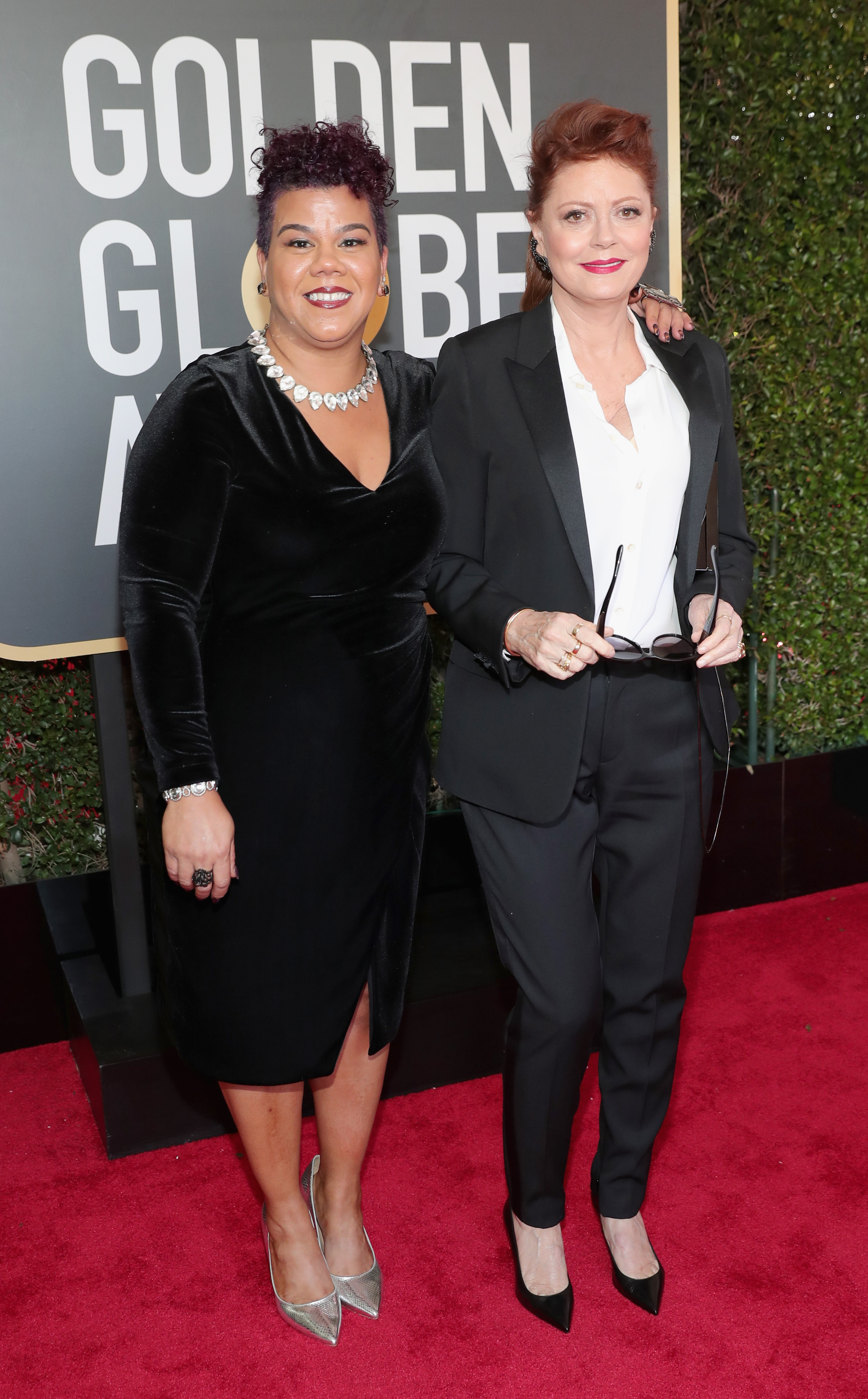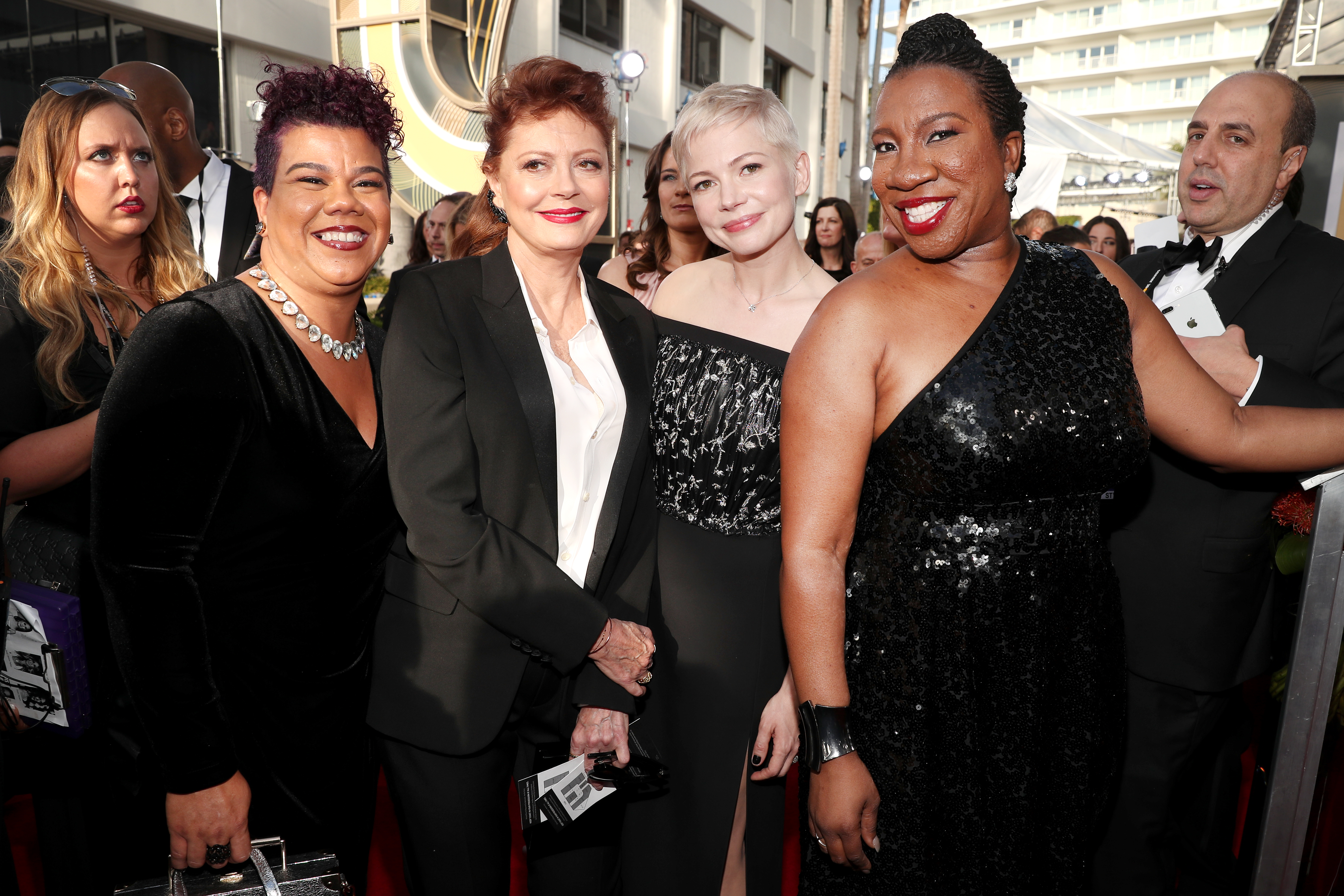
Source: Neilson Barnard/NBCUniversal / Getty
On Sunday (January 7), Michelle Williams, Emma Watson, Susan Sarandon, Meryl Streep, Laura Dern, Shailene Woodley, Amy Poehler, and Emma Stone were joined by activists Tarana Burke, Marai Larsai, Rosa Clemente, Ai-Jen Poo, Mónica Ramírez, Calina Lawrence, Billie Jean King, and Saru Jayaraman at the Golden Globes.
Rosa Clemente is an Afro-Puerto Rican organizer who has dedicated her life to combating the political struggles facing Black and Latinx people. Rosa has been a relentless, unstoppable force in activism, academia, and politics for over 20 years. She is a leading scholar on the issues of Afro-Latinx identity and political issues in hip-hop. She ran for Green Party Vice President in 2008 with Cynthia McKinney, making them the first women of color ticket in American history. Most recently, Clemente started a project called “PR on the Map,” where she and a group of Latinx journalists went to Puerto Rico post-Hurricane Maria to tell the untold stories of the commonwealth’s people.
Rosa talked to CASSIUS about the events leading up to the Golden Globes, how her work was received by those in attendance, and her most memorable moments of the night.
CASSIUS: So we know the Time’s Up effort has been going on for months in the making. Walk us through how you and the seven other activists were invited to the Golden Globes.
ROSA CLEMENTE: First of all, I really want to make it a point to uplift the women of color who put the “Time’s Up” initiative together and made this entire thing possible. Many actresses were inspired by the letter from Monica Ramirez in Time magazine on behalf of the National Farmworker Women’s Alliance. From there, America Ferrera put a call out to Reese Witherspoon, and then Tracee Ellis Ross came in alongside Tessa Thompson. I know many people were asking why we didn’t attend with the women of color, but since those women weren’t nominated, this is how it went down.
Michelle Williams, who was part of the beginning collective group, came up with the idea of inviting Tarana Burke, the founder of #MeToo. When she reached out, Tarana said to the group, “It’s not just about me. I know of some women that would be down, I think it’d be good that we go as your dates.”
C: That’s incredible. How did you feel finding out you were going with Susan Sarandon?
RC: Personally, for me, I have a relationship with Susan Sarandon that goes way back. She’s been doing work around police brutality since Amadou Diallo, a young Black man who was shot and killed by four NYPD policemen, and even got arrested back in the day so that the officers who killed him would be indicted. Susan is an icon, but she said she was glad to see a new generation of young women like Emma Stone, Emma Watson, and Shailene Woodley because they’re all under 30, they’re blowing up, and they’re making very specific choices with the type of work they’re engaging in.
C: I had no idea Susan Sarandon’s been in the game for that long, that’s so comforting to hear. Can you walk us through what happened when you touched down in L.A. for the weekend?
RC: When we arrived in L.A., we had an all-day meeting on Saturday until about five or six in the afternoon. At the end of the meeting, it was just the activists with the eight actresses who were taking us to the ceremony. We were able to go even deeper and flesh out the nuances of what should happen on the red carpet. We weren’t going to engage in a conversation about predators with reporters because we weren’t talking about them—we were talking about the survivors and our personal causes.
C: Right, and I love how to an extent, you were able to get comfortable with these other women the day before you head out to the show. How did that conversation spill over to the red carpet?
RC: On the night of the event, when Susan and I arrived, we were right behind the Stranger Things cast. We weren’t able to take pictures with them, but I was able to talk to Caleb McLaughlin. I complimented him on his Time’s Up button. He responded, “I’m part of a new generation of young men. We’re going to make sure that our friends don’t act in any disrespectful way.”
Once we hit the red carpet, the energy was electric and hectic. I was surprised that so many reporters knew what we were there to do. They’d begin to talk to Susan, but she’d respond, “No, this is great, but actually I’m here for this,” and then turn it over to me. The actresses did that for all of us, which is why we were able to have good conversations with the press. So many of the famous people came up to me saying, “Thank you for being here. Thank you for your work.” It was way better than I thought it would be.

Source: Christopher Polk/NBC / Getty
I need them to understand that none of us wanted to be a prop.
C: I’m so glad that happened, you were able to actually get your message out to so many different celebrities on the carpet.
RC: Right, and since then, many people asked why they didn’t have us on stage. I need them to understand that none of us wanted to be a prop. Award ceremonies move too quickly and we wouldn’t have been able to get across our respective messages if we just stood on the stage and said nothing.
C: Was there a specific interaction with a celebrity that stuck out to you from that night?
RC: There were a couple, actually. I was able to salsa dance with Salma Hayek, which was incredible. Her piece for The New York Times was so powerful. We agreed that we weren’t going to talk about predators that night, but she said she had never felt as empowered as she did that weekend. Another memorable interaction was with Sterling K. Brown and his wife, Ryan Michelle Bathe. I went up to him to let him know how much I loved him and his show. It turned out his wife read my work in college and they offered to support my work.
On some fun shit, though, Tarana and I requested a Cardi B song at the after party. We danced with Seth Meyers and I just thought, “Yo, this is crazy.”
I’ve been in a lot of situations where you link up with a celebrity and you can never contact them again. But I don’t think that is the case here. They’ve already reached out asking when we’re going to connect again, and I think they’re trying to engage more movement folks.
C: So ultimately, how do you think your experience at the Golden Globes helped move your cause for Puerto Rico forward?
RC: I haven’t truly assessed that yet, but I can tell you that I haven’t gotten one donation since that night. That’s okay because I wasn’t expecting anything — my cause, PR on the Map is a project. But I’d be curious to know if the #MeToo movement, the National Domestic Worker’s Alliance, or any of the other organizations got some private donations. But for many people, if there are eight issues on the red carpet and you have to rank them, Puerto Rico is on the bottom — including in movement circles. The scale of the problem is so big, and every issue intersects: environmental justice, sexual violence, exploitation, charter schools. They’re probably gonna try to do other things instead of rebuilding the public school system, or addressing PROMESA, or the problems with the Puerto Rico Electric Power Authority.
Whether its movement spaces or collectives, there is no movement where Puerto Ricans haven’t been there. There’s no protest or rally where you never see at least one Puerto Rican repping with our flag like, “Yes, we got you. We understand.” But it hasn’t always been reciprocal.
But no matter what, even though we walked that red carpet, we also worked that red carpet. We literally came to work for our causes and I’m grateful for that opportunity.
EDITOR’S NOTE: This conversation has been edited for brevity and clarity.
















